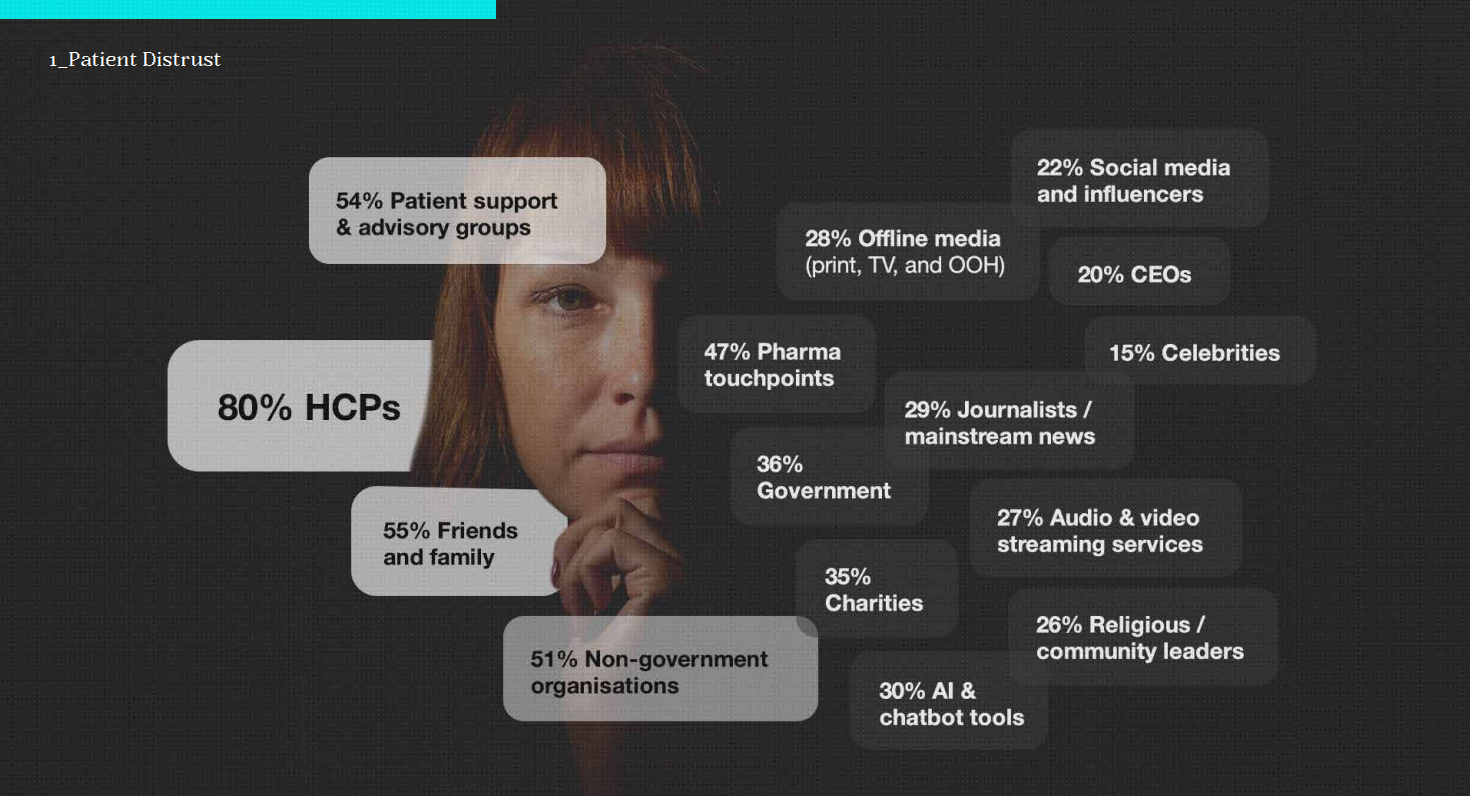6th November 2025
BlogIt’s more vital than ever that pharma are attuned to the decay in trust being witnessed, and the damage misinformation can cause.
Look at the mission statement of almost any pharmaceutical company and it will state that their main goal is to improve patients’ lives. Pfizer’s purpose is “breakthroughs that change patients’ lives”.1 Sanofi “chase the miracles of science to improve people’s lives”.2 Bristol Myers Squibb’s vision is to “transforms patients’ lives through science”.3 So naturally, pharma needs to be a part of the conversation when it comes to trust and misinformation. Particularly, as the debate swirls around the future role of direct-to-consumer (DTC) advertising in the US market, with the current administration enforcing FDA oversight and regulatory frameworks around drug advertising, and the calls to redesign the commercial model of medicines, it’s more vital than ever that pharma are attuned to the decay in trust being witnessed, and the damage misinformation can cause on the very lives of patients they’re trying to improve.
Historically, the structure of trust in health was local, personal, and authoritative. The ‘family doctor’ knew each patient by name, their history, family, and circumstances. Care was continuous, and relationships were built over years, often under a paternalistic model where medical authority was rarely questioned. Accelerated by the end of World War II, health authority scaled upwards. Global and national institutions like the World Health Organization (WHO), and the NHS emerged as symbols of stability and expertise, reinforcing a top-down model of trust that shaped global health for decades.
But today, that model is under strain. Resentment not just of institutions but of ‘the system’ at large is growing across the world.4 During the last few decades Western countries have seen a colossal loss of confidence in traditional political parties, giving rise to “anti-party parties” and a cascade of anti system political victories. A series of high-profile betrayals ranging from the global financial crisis to media misconduct and corporate fraud have further eroded public confidence, with the fear that government, business leaders, and journalists purposely mislead them at a global all-time high.5 Healthcare has not been immune. The opioid crisis is an obvious example of where deceptive and harmful practices from within the pharmaceutical industry have caused lasting damage not only in the lives of those affected by addiction and inadequate care, but in the deep mistrust many now feel toward pharmaceutical
companies. Today, pharma remains one of the least trusted industries, with polls placing trust in the sector below that of oil companies and banks.6

The perception of elitism around science and academia – that it exists in an ivory tower, disconnected from the concerns of everyday life – fuels this distrust and division.8 Today, science isn’t just debated—it’s politicised. Whether it’s disputes over vaccines or public health measures, the ‘us vs. them’ mentality is leveraged to undermine trust in evidence-based science. Once steadfast organisations like WHO – “trusted to care for the world’s health” – have themselves become polarising.9 Point.1, our proprietary data platform, reveals that just half of patients trust health information from non governmental health organisations, signalling how fractured confidence in global health institutions has become.7
As previous pillars of authority falter, patients are bypassing traditional health authorities in favour of informing themselves via patient-led communities
that feel more relatable, and more responsive, than official sources.7 HCPs, too, are moving away from traditional pharma-led education toward peer-driven communities and digital learning: when looking to understand new information about a disease, HCPs are significantly more likely to be influenced
by non-pharma owned media, than media owned by pharma.7 Former Oxford University Trust Fellow Rachel Botsman argues that this flattening of hierarchies is reshaping how trust is built and where authority resides. In the digital age, she says, trust now flows “sideways, instead of top-down”.10 In other words, people are no longer looking upwards to authority figures or institutions for health guidance – they’re looking across to their peers, communities, and networks that offer authenticity, transparency, and shared experience.
Already, patients and HCPs are gravitating towards educational, disease-focused content. Pharma-sponsored awareness campaigns are outperforming
traditional DTC in trust and engagement. Brand-owned platforms, accessed post-prescription, are seen as more credible and useful. If pharma can pivot from promotion to public health shapers, from selling to serving, it can reclaim its relevance. By becoming data-driven disease educators, not simply prescription pushers, pharma has the chance to make a meaningful impact – not just on patient lives, but on public trust itself.
Head to the Doctored Truths Report to continue reading and find out more.
Sources
- Pfizer. Our Purpose. Available at: https://www.pfizer.com/about/purpose. Accessed: September 2025.
- Sanofi. Our Company. Available at: https://www.sanofi.com/en/our-company. Accessed: September 2025.
- Bristol Myers Squibb. Our mission. Available at: https://www.bms.com/about-us/our-company/our-mission.html. Accessed: September 2025.
- Wellbeing Research Centre at the University of Oxford. World Happiness Report 2025. Available at: https://www.worldhappiness.report. Accessed: September 2025.
- Edelman trust institute. 2025 Edelman Trust Barometer Global Report. Available at: https://www.edelman.com/sites/g/files/aatuss191/files/2025-01/2025%20Edelman%20Trust%20Barometer%20Global%20Report_01.23.25.pdf. Accessed: September 2025.
- BioPharma Dive. Public trust in drugmakers is at an all-time low. Can biopharma recover? Available at: https://www.biopharmadive.com/news/pharma-industry-public-trust-gallup-business-roundtable/561986/. Accessed: September 2025.
- Point.1 – proprietary data platform. Data on file.
- Looby, C. Trust in science. RSA Journal. Issue 1 2025. 40–43.
- World Health Organization. Who we are. Available at: https://www.who.int/about/who-we-are. Accessed: September 2025.
- BBC Radio 4. The Trust Shift – Distributed Trust [Audio], first broadcast 18 October 2024. Available at: https://www.bbc.co.uk/programmes/m001xmfm. Accessed: September 2025.
